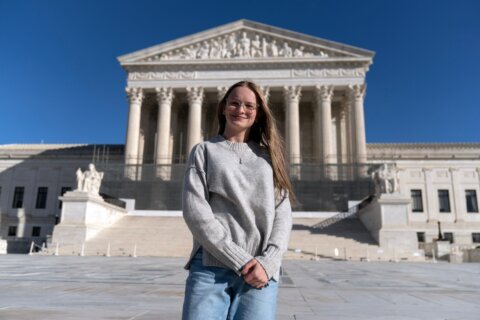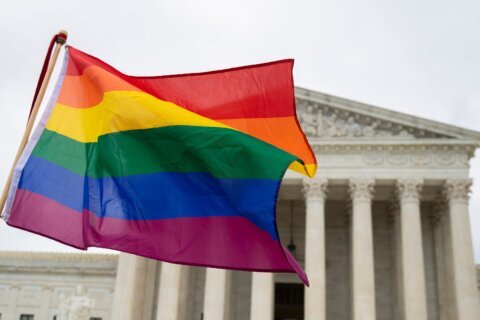It’s not just that US Supreme Court majorities upheld Mississippi’s 15-week abortion ban and overturned Roe v. Wade. The opinion also skewed the crux of the conversation going forward — with just three words.
“Unborn human being” is the term Associate Justice Samuel Alito adopted from the Mississippi statute, thereby replacing the key phrase in the landmark 1973 Roe ruling that spelled out a constitutional right to abortion: “potential life.”
It may seem like a semantic argument. Experts say it’s anything but.
Alito didn’t write God or Christianity or Bible anywhere in the opinion, but his justification is a veiled “religious narrative,” said Rebecca Todd Peters, a religious studies professor at Elon University. By co-opting the language in Mississippi’s law in Dobbs v. Jackson Women’s Health Organization, the majority opinion gives credence to the notion — embraced largely by the religious right — that life begins at fertilization, she said. The ruling has already emboldened several states to ban and criminalize the medical procedure in almost all circumstances.
“That is an enormous shift,” Peters said. “It erases whole groups of people who have different religious beliefs.”
Peters, who is ordained in the Presbyterian Church, isn’t merely speaking about Christians. When a zygote, embryo or fetus becomes a human being is far from an objective determination within or across any religions. There is no scientific gauge: Doctors tend to focus on viability, which experts believe to be around 23 weeks, though health outcomes improve the longer the gestational period. Various religions have relied on a range of wayposts, including fertilization, quickening (when the mother feels the fetus moving), when the embryo develops a heartbeat, ensoulment and birth.
Confounding matters is that, just like in Christian sects, there are chasms of disagreement among other religions — not only regarding personhood but also a woman’s bodily autonomy — making holy texts a troublesome barometer for whether abortion should be outlawed. Worse, said Peters, is that by co-opting the term, “unborn human being,” it signals “which religious voices get authority and power in our country.”
Though opponents of legalized abortion often paint women who undergo abortions as heathens, a strong majority — more than 6 in 10 — identified as women of faith in a 2014 poll, said Peters, who is on sabbatical for a research project titled, “Abortion and Religion: Listening to Women.”
“There are a whole lot more who support bodily autonomy for mothers to make decisions about life and how many children they have and who they have them with and how to shape their future with or without partners,” Peters said. “We’ve allowed a minority religious belief to curtail the rights of the majority of women in the country. I feel like I’m in the middle of a dystopian novel.”
More than 50 religious groups sought to make this clear to the high court last year, filing a friend-of-the-court brief explaining religious traditions have various views of when life begins, affirm a woman’s “moral right” to decide when to terminate pregnancy and stand by “the importance of ensuring reproductive choice for women in marginalized communities who are disproportionately harmed by the ban.”
“By prohibiting abortions beyond 15 weeks gestation, the Ban precludes women from making that choice in accordance with their own moral, spiritual, and religious beliefs, which this Court has recognized as a constitutional right,” the brief said.
The attitude that a woman would have to justify her decision to others is “rooted in religion,” Peters said. It robs women of their autonomy and espouses a narrow, archaic view of Christianity that has long been malappropriated to dictate “women are to be subservient and meant to be child bearers,” she said.
Religions and religious people vary widely
A Gallup poll in May — before Roe’s reversal — found 55% of Americans identified as “pro-choice,” while 39% said they’re “pro-life.” Only 13% of Americans said abortions should be prohibited across the board, and 53% said abortions should be legal in most or all circumstances, Gallup reported.
Breaking the percentages down by dogma demonstrates only a handful of groups — Jehovah’s Witnesses (68%), Mormons (66%) White evangelical Protestants (65%), Hispanic Protestants (58%) and Hispanic Catholics (52%) — count a majority of members as opposing abortion, the nonprofit Public Religion Research Institute found in 2018.
Catholics have long driven the debate on abortion — and five Catholics and a justice who was raised Catholic upheld Mississippi’s 15-week ban — even as the institute’s data suggests 52% of White Catholics are OK with legal abortion. (It is worth noting Associate Justice Sonia Sotomayor broke with her fellow Catholics in Dobbs.)
Here is a look at support for legal abortion in most or all cases among other religions, per the institute:
• Muslims — 51%
• Orthodox Christian — 54%
• Black Protestants — 56%
• White mainline Protestants — 59%
• Hindus — 62%
• Buddhists — 69%
• Jewish people — 70%
And 87% of agnostics and 97% of atheists expressed support for abortion in all or most cases, the Pew Research Center reported this year.
Those numbers are black and white, of course, but religions and their adherents are not, so to cast attitudes as “for” or “against” disappears nuance from the equation. There are other factors to consider, experts say.
Islamic scholars, for instance, took a more liberal stance in premodern times, said UCLA law professor Khaled Abou El Fadl, an Islamic jurist who holds a doctorate in Islamic law from Princeton University.
There was a time when women so often miscarried in the first trimester that some jurists didn’t regard the fetus as a full human being, while others debated when the soul enters the fetus — somewhere between 40 and 120 days, the professor said. Still, there were some conservative-minded jurists who felt the “potentiality of life” should always be protected, he said.
The conversation began to shift during colonialism, with the influence of French law and the creation of state governments, Abou El Fadl said.
“It’s interesting because the medieval debate in Islamic law was about when the soul enters the body. We don’t have an Islamic text on that — nothing in the Quran, nothing in the inherited traditions of the Prophet Muhammad that answers the question,” he said, explaining that once “the state became much larger in everyone’s life and the whole idea (arises) that the state has the right to regulate and enforce morality,” most if not all Muslim nations banned abortion except to save the mother’s life.
Judaism takes a similar position on allowing abortion to save the mother. “Judaism is a religion that is based on law,” and there are no religious figures — no popes or imams — who can allow something Jewish law prohibits, said Dr. Daniel Eisenberg, an expert in Jewish medical ethics and a radiologist at Einstein Medical Center Philadelphia.
The issue of when life begins is not a Jewish concept, he said. The question is: When does Jewish law protect life? The general consensus is when it’s necessary to protect a mother’s life. Outside that, “the range of opinions is from a Biblically forbidden form of murder without being a capital offense to being a rabbinic prohibition that is very serious but not murder.” Abortion is never a capital offense in Jewish law, he said.
“A fetus is going to become a full-fledged human being, but it is not considered to be a full-fledged human being until it is born. But not being a human being does not mean it’s nothing,” said Eisenberg, who has spent years studying and lecturing on the Talmud and Jewish law. “The concept is that the fetus is a person with slightly less protection than a full-fledged human being, than the mother. … When it is a threat to the mother, it is subordinate.”
There is no official position in Buddhism, and Buddhist scholars vary, with some saying the fetus is a human at fertilization and various others saying personhood begins weeks or even five months later, author and lay dharma teacher Sallie Jiko Tisdale wrote last year in the quarterly, Tricycle: The Buddhist Review.
“Nevertheless, the conclusion of orthodox Buddhist scholars has long been that a human being appears at the moment of conception. Because human birth is a rare and precious gift, to deprive a being of the opportunity is a grave mistake,” she wrote.
Hindu teachings elevate the life of the mother and support a ban on abortion except to save her life, experts say.
“Abortion deliberately disrupts the process of reincarnation and kills an innocent human being … and imposes serious karmic burdens on its agent,” wrote Dr. Kiarash Aramesh, director of the James F. Drane Bioethics Institute at Edinboro University, in 2019. “The perspective of Hinduism is a very pro-life one, emphasizing Ahimsa (not causing harm to living creatures) and its intrinsic reverence for life.”
Across all religions, scholars can further diverge when the issues of birth defects, rape, incest and the mother’s mental health are at play. Older texts provide little guidance on the latter because sensitivity to mental health is a relatively new concentration in medicine, experts say.
Many Jewish scholars see the law as condoning abortion if the mother exhibits suicidal ideation, Eisenberg said. Some Islamic scholars feel suicide is a choice, Abou El Fadl said, but as a jurist, he understands many who contemplate suicide feel they have no choice and he’d consider each case on its own merits.
As for rape and incest, Islamic scholars are split, he said, but he points out even in Egypt, where abortion is forbidden in cases of rape and incest, it’s rarely if ever prosecuted.
In Judaism, the law’s interpretations are so varied on rape and incest, Eisenberg suggested it warranted a news article to itself. Abortion following the detection of birth defects, lethal or otherwise, also divides rabbis, he said, but he points out that despite the American debate’s focus on rape, incest and birth defects, those reasons prompt only a small fraction of abortion procedures.
Most commonly, women seek abortion because a child would disrupt their lives or because they cannot afford a baby — reasons, Eisenberg said, traditional Jewish law would never condone. As the polling suggests, certain groups and branches of the faith hold different views. Elsewhere on the spectrum is the politically progressive Reform Judaism — the country’s largest denomination, accounting for a third of American Jews — which holds a mother maintains total autonomy when deciding whether to terminate a pregnancy.
‘They also believe God forgives sins’
For Peters, the debate should revolve around a woman’s right to control her fate, she said. As she cowrote in a January column, “It often seems religion is not even a relevant statistical data point in understanding who gets abortions. In fact, 62 percent of women who have abortions identify as women of faith. Religiously identified women, with the notable exception of evangelical women, have abortions at virtually the same rate as their representation in the population.”
Yet proponents of outlawing abortion continue to perpetuate a false binary, “this sort of popular perception that religion is against abortion and all the people for abortion are secular — and that is just not true at all,” she said. “It’s a dangerous narrative that has shaped our culture’s understanding of abortion.”
Peters has interviewed dozens of women for “Abortion and Religion: Listening to Women,” including those who opposed abortion rights before terminating their own pregnancies. She’s found women often have abortions out of a love they feel coincides with their religions, she said.
The debate is so “stigmatized and mean-spirited” and women are stereotyped and caricatured, but Peters has found women have “very complex, complicated, unique experiences” and pursue abortions because they can’t give a child what she or he deserves materially and spiritually. They experience a host of feelings, sometimes contradictory: sadness and happiness, relief and guilt.
“Nobody’s confused. There’s no sense of, ‘Did I do the right thing?'” she said. “There are women who feel guilty, who feel like having an abortion may be a sin, but they also believe God forgives sins.”
Abou El Fadl doesn’t consider himself pro-abortion. He wouldn’t want his daughter to terminate a pregnancy, but as a jurist, he cannot be bound to a single issue, he said. He must consider the totality of circumstances, and he worries about a Supreme Court hewing to an originalist perspective endorsed by Founding Fathers who accepted slavery and all sorts of discrimination. This is largely the same high court that upheld President Donald Trump’s “Muslim ban,” he noted.
“Muslims, who are already targets of Islamophobia and incredible amounts of racism, do we really want to live in a country with less rights?” he asked. “It’s very hard for me to forget about the role of the state and say it’s a simple matter of: Do we kill babies or do we not kill babies?”
Whether she’s escorting women to a clinic, teaching at Elon or simply having dinner with friends and family, Peters said, she’s guided by Scripture — verses that command she care for the poor and marginalized, love her neighbors and seek social justice.
To those who’d call her abortion views heretical, she’d point out the Bible says nothing explicitly about abortion. She’s also never found a pregnant woman who was not invested in what might happen to her potential child. Suggesting otherwise — or pitting a mother against her fetus for political points — is more than problematic, she said.
“Pitting women against their prenate is a fiction we are now building our legal system around, and I think that’s very dangerous,” she said. “The problem is the belief that life begins at conception is a theological belief. … I think it’s a bit of a false argument in the sense that it’s not a theological belief that people are fully autonomous individuals with legal and human rights. The idea a fertilized egg should be afforded the exact same rights — it’s fine to have that belief if you don’t impose it on others.”






